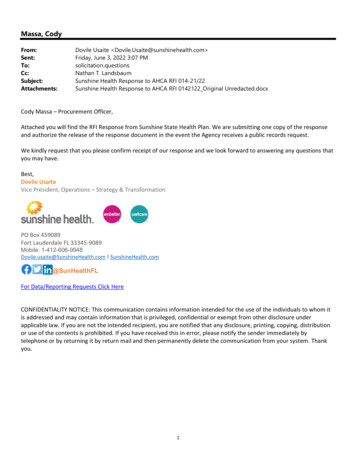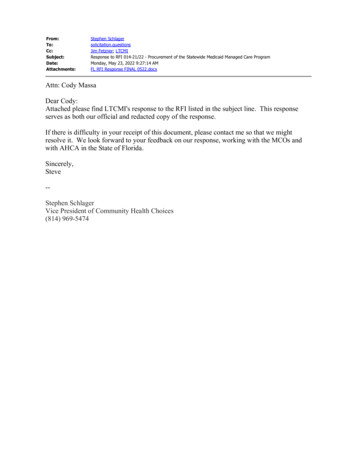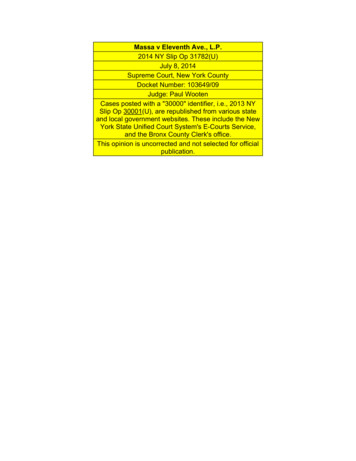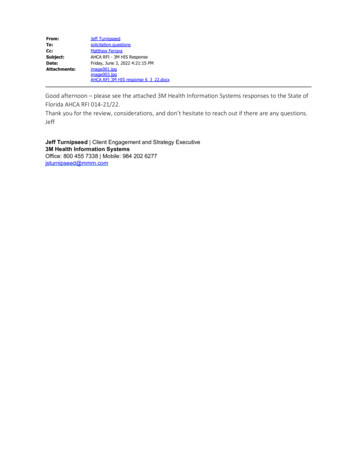
Transcription
Massa, CodyFrom:Sent:To:Cc:Subject:Attachments:Dovile Usaite Dovile.Usaite@sunshinehealth.com Friday, June 3, 2022 3:07 PMsolicitation.questionsNathan T. LandsbaumSunshine Health Response to AHCA RFI 014-21/22Sunshine Health Response to AHCA RFI 0142122 Original Unredacted.docxCody Massa – Procurement Officer,Attached you will find the RFI Response from Sunshine State Health Plan. We are submitting one copy of the responseand authorize the release of the response document in the event the Agency receives a public records request.We kindly request that you please confirm receipt of our response and we look forward to answering any questions thatyou may have.Best,Dovile UsaiteVice President, Operations – Strategy & TransformationPO Box 459089Fort Lauderdale FL 33345‐9089Mobile: 1-412-606-9948Dovile.usaite@SunshineHealth.com I SunshineHealth.com@SunHealthFLFor Data/Reporting Requests Click HereCONFIDENTIALITY NOTICE: This communication contains information intended for the use of the individuals to whom itis addressed and may contain information that is privileged, confidential or exempt from other disclosure underapplicable law. If you are not the intended recipient, you are notified that any disclosure, printing, copying, distributionor use of the contents is prohibited. If you have received this in error, please notify the sender immediately bytelephone or by returning it by return mail and then permanently delete the communication from your system. Thankyou.1
State of FloridaAgency for Health Care AdministrationRequest for Information RFI 014-21/22Re-Procurement of the Statewide Medicaid Managed Care ProgramSubmitted by:Sunshine State Health Plan, Inc.PO Box 459089Fort Lauderdale, FL 33345-9089ORIGINAL / UNREDACTED
State of Florida Agency for Health Care AdministrationRequest for Information 014-21/22A. The Respondent’s name; place of business address(s); web site address, if applicable; and contact information,including representative name and alternate, with telephone number(s) and e-mail address(es).Name: Sunshine State Health PlanPlace of Business Address: PO Box 459089, Fort Lauderdale, FL 33345-9089Web Site Address: https://www.sunshinehealth.com/Contact: Nathan T. Landsbaum, Nathan.landsbaum@sunshinehealth.com 954-908-8040Alternate: Dovile Usaite, Dovile.usaite@sunshinehealth.com 412-606-9948B. A description of how the Respondent's approach will offer advantages or improvements over existingprocesses of the SMMC Program. The description should also identify known or potential concerns with theapproach.Sunshine State Health Plan, Inc. (Sunshine Health) has operated as a managed care organization in theStatewide Medicaid Managed Care (SMMC) program in Florida since 2009. Today, Sunshine Health isthe largest Medicaid managed care organization (MCO) in Florida, providing care for more than 2.3million Floridians, including over 1.73 million individuals within the Comprehensive MMA and LTCprogram, the Serious Mental Illness (SMI) Specialty Plan, and the Child Welfare (CW) Specialty Plan. Wealso offer Marketplace, Medicare Advantage, Medicare Prescription Drug Plans, and Dual special needsplans, providing the full continuum of coverage for Floridians at all stages of life. As part of our missionto transform the health of the community, Sunshine Health also partners with the Department ofHealth to provide care for children with special healthcare needs through the Children’s MedicalServices Health Plan.We are proud of what we have accomplished in partnership with the Agency for Health CareAdministration (AHCA) to deliver accessible, equitable, and culturally sensitive care to fellow Floridianswho need it most.Sunshine Health appreciates the opportunity to share our thoughts and ideas. We look forward tolearning about the innovations and best practices shared across stakeholders to improve the SMMCprogram and contribute to optimal outcomes. As a managed care organization, our role is to effectivelyand efficiently manage and promote the delivery of healthcare services. This responsibility includes acommitment to improving provider and SMMC recipient experience, access to providers and services,and cost efficiency across the program. For this RFI response, we organized our innovative ideas,lessons learned, and best practices into the following categories, each touching on several of thethemes AHCA highlighted as areas of interest: Improving Providers’ Experience with the SMMC Program Improving Recipients’ Experience with the SMMC Program Increasing Timely Access to Providers and Services Achieving Cost Savings Throughout the SMMC ProgramImprove Providers’ Experience with the SMMC ProgramRecommended Value-Based Payment (VBP) Designs to Increase Quality and Reduce CostsSunshine Health believes broad adoption of the VBP models described below will result in improveddata sharing across products and service delivery entities. We recommend AHCA encourage MCOs to: Offer a selection of VBP models informed by provider input and aligned with Health Care PaymentLearning & Action Network (HCP-LAN) categories 3.B (Alternative Payment Models with SharedSavings and Downside Risk) and above, which are designed to increase quality outcomes whilesimultaneously bending the cost curve.Transforming the health of thecommunity, one person at a time.1
State of Florida Agency for Health Care AdministrationRequest for Information 014-21/22Offer at least one HCP-LAN category 3.B or above VBP model designed to reward primary careproviders (PCPs) that maintain performance against defined quality and cost containmentthresholds, such as Sunshine Health’s program, which includes program participant PCPs servingmore than 450,000 of our Medicaid members. Offer at least one Long Term Care (LTC) VBP model designed to foster transition of care to assistedliving facilities or other home-based community services locations, such as Sunshine Health’sTransitions of Care model, which incentivizes Assisted Living Facility (ALF) providers who supportLTC members in maintaining their independence in a community setting following a transition froma custodial nursing home stay. Sunshine Health implemented this model in 2019, resulting in thetransition of over 1,000 members into a community setting and provided over 1 million inincentive payments to our ALF providers. Offer at least one HCP-LAN category 3.B or above VBP model designed to reward practices thatprovide, at a minimum, integrated primary health (PH) and behavioral health (BH) services and thatmaintain performance against defined quality and cost containment thresholds, such as SunshineHealth’s Behavioral Health Home model which serves more than 16,000 of our Medicaid members. Implement VBP models designed to incentivize providers for applying Evidence-Based Practices(EBPs) targeted to specialist or member cohorts, such as Sunshine Health’s Child Welfare EBPIncentive model. Align VBP model quality metrics and outcome thresholds with AHCA’s Comprehensive QualityStrategy, and the Florida State Health Improvement Plan. Continuously assess readiness among provider networks for movement along the HCP-LANcontinuum toward VBP models designed to increase quality while reducing costs and applying atailored approach to supporting each provider toward achieving their goal. Actively solicit feedback from specialty providers, including BH providers and LTC providers, on thedesign of advanced VBP models that would be attractive and meaningful among specialty providerpractices and their member panels.Recommended Provider Administration Simplification Strategies to Promote the Quadruple AimWe recommend AHCA encourage MCOs to: Support implementation of a centralized credentialing solution. Sunshine Health’s affiliateMedicaid health plans that participate in centralized credentialing processes, including those inTexas and Georgia, have received overwhelmingly positive feedback from their provider partnerson the reduction of the administrative burden associated with decentralized credentialing. Support implementation of a centralized provider demographic solution. This initiative would allowproviders to submit demographic changes (such as phone number, address, and e-mail) to a singlesource versus submitting to multiple MCOs and would be aligned with the centralized credentialingsolution. Collaborate on implementing and maintaining a single, payer-agnostic electronic PriorAuthorization (PA) submission solution. Offer incentives such as a “Gold Card” program through which MCOs minimize administrativelyburdensome processes among high-performing providers, such as implementing certain claimedits.Recommended Best Practices to Reduce Administrative Burden and Maximize VBP Success Reducing Provider Administrative Burden through a High Touch, Local Provider Engagement (PE) Transforming the health of thecommunity, one person at a time.2
State of Florida Agency for Health Care AdministrationRequest for Information 014-21/22Model. We recommend that AHCA require MCOs to hire Florida-based provider-facing PE staff withoffices located within the region they are supporting to better understand the unique challengesproviders and members face within their communities.Maximizing VBP Success and Reducing Administrative Burden through Common Support ToolsWe recommend AHCA require MCOs to: Develop tools that regularly assess providers’ capacity for practice transformation, VBP readinessor advancement, and performance improvement. Collaborate to identify and standardize the type of performance data and reports that would assistprimary care providers, BH providers, specialty providers, LTC providers and hospitals in supportingkey quality outcomes that align with AHCA’s Comprehensive Quality Strategy to ensure alignmentin improving the health of the community.Recommended Strategies to Reduce Administrative Burden during Member Transitions of CareMember transitions of care often involve multiple providers across care settings; members and theirfamilies/caregivers; and complex medical and social needs, which can contribute to provideradministrative burden. We recommend AHCA consider the following: Ensure continuity of care and non-disruption of services during transitions of care at both amember and provider level. We recommend AHCA require MCOs to share a standard set of healthinformation including the member’s care plan and a historical member profile, inclusive of openauthorizations and providers seen in the last six months, as members transition across productsand/or health plans (SMI/LTC, Child Welfare and CMS, aging out of foster care, etc.). For example,Sunshine Health facilitates a comprehensive pediatric to adult provider program that includestraining and assistance with transferring health records and supporting the member to a successfultransition. Include additional CPT codes for “transition-related services” such as 99449, 99451, 98972, withinthe Medicaid Fee Schedule. The additional codes will support improved communication acrossproviders and coordination of care for the member transitioning.Improve Recipients’ Experience with the SMMC ProgramImproving recipient experience fundamentally starts with engaging with the member in a way thatmakes them feel connected, makes it easy for them to access care, and meets them where they are intheir healthcare journey. The following would help MCOs better engage their members: Contact Information on the 834 File. One basic, but fundamental aspect of engagement is ensuringwe can contact the member timely. To aid in this, we recommend that AHCA partner with theDepartment of Children and Families (DCF) to require members provide their cell phone and emailcontact information upon enrolling. Making these fields mandatory in 834 file transmissions to theSMMC MCOs will greatly increase member engagement and touchpoint opportunities. Forexample, in 2019 when a Centene health plan started emailing member reward reminders, thehealth plan saw a 14% increase in member rewards usage. Electronic Document Sharing. Allow MCOs to share documents with members through theirpreferred choice of communication, including text, email, and postal service. Member Education. Encourage MCOs to educate members on the importance of sharing healthinformation across payers and providers. Operationalizing this will require obtaining memberdirected consent upon enrollment to share information across payers and providers.Additional best practices and innovations to improve recipient experience are described below.Transforming the health of thecommunity, one person at a time.3
State of Florida Agency for Health Care AdministrationRequest for Information 014-21/22Make Health Care Services Not Only Available – But Accessible Encourage MCOs to increase access to telehealth and provide telehealth technical support servicesfor recipients. Encourage MCOs to incentivize providers to expand office hours to evenings and weekends. Recommend AHCA evaluate network accessibility criteria instead of availability. These new criteriacould adopt the inclusion of telehealth providers, in-home providers, and in-lieu-of providers withinaccessibility standards.Employ Trusted Messengers to Engage Recipients in the Communities Where They LiveCommunity health workers engage members by meeting them at their points of need in thecommunity and offer face-to-face and frequent support to encourage members to make healthychoices, engage in preventive care, and promote improved health and wellness. We recommend thatMCOs connect members with community health workers through referrals to organizations such asregional Pathways Community HUBs. The Pathways Community HUB model is an evidence-basedstrategy to address health disparities and promote improved health outcomes by allowing communityhealth workers to receive incentives for coordinating needed services. A study of the Northwest OhioPathways HUB found that high-risk mothers that did not receive services through a HUB were “1.55times more likely to deliver a baby needing a special care nursery or care in a neonatal intensive careunit, compared to high-risk members who received services from the HUB1.”MCOs should work collaboratively with multi-sector entities and system partners, including FloridaDepartment of Children and Families (DCF) Care Coordinators and Care Navigators. Collaborativeinitiatives may include addressing health literacy through culturally competent education to assistmembers in understanding their benefits, the importance of preventive care and managing chronicconditions. Provide person-centered care decision support, including caregiver and family supporttools, that empower members, caregivers and their families to make informed decisions about theirwhole health needs.Removing Social Determinants of Health (SDOH) BarriersMembers’ healthcare needs are often complicated by SDOH gaps that serve as barriers to achievingoptimal care and can impact a member’s ability to take personal responsibility for their health andwellness and negatively impact their experience with the healthcare system. Identifying and addressingsocial determinants (e.g., access to healthy food and safe, stable housing, lack of transportation, etc.)through health risk screenings and assessments can improve health for members. Use of socialdeterminant data coupled with claims and other supplemental data can assist MCOs in tailoringengagement strategies.MCOs can educate members on the availability of community-based resources and help them accessthese resources through a community resource and referral tool with closed loop referral capabilities.We recommend that MCOs offer a searchable database of vetted and regularly updated communitybased health and wellness resources and refer members to these resources to address SDOH needs,documenting (closing the loop) when members receive those services. We also recommend requiringMCOs to report the number of SDOH referrals and documentation of closing the loop on the referral.For example, Sunshine Health’s community resource platform, which is available to the public,provides information on available community resources that address SDOH, including outreach andengagement to ensure the member referral gap has been closed.1T.R. Goldman, “Charting A Pathway To Better Health,” Health Affairs Vol. 27, no. 12 (2018): 1921.Transforming the health of thecommunity, one person at a time.4
State of Florida Agency for Health Care AdministrationRequest for Information 014-21/22In addition, MCOs should be encouraged to offer expanded benefits to help members with SDOHbarriers. Examples include offering an expanded transportation benefit to safety net support serviceslike WIC appointments, job fairs/interviews, career counseling, and peer support services such asAlcoholics Anonymous and Narcotics Anonymous.Leverage the managed care delivery system, either through expanded benefits or other mechanisms, to promotesustainable economic self-sufficiency among Medicaid recipients in the short and long term.Social factors such as poverty, food insecurity, housing, and employment can affect an individual’soverall health and well-being. Sunshine Health is aware that one social barrier does not exist in theabsence of others. To help members achieve and/or sustain economic self-sufficiency, an MCO needsto have a holistic view of all social barriers and processes and systems in place to assess and addressmembers’ social barriers. For example, if a work-ready member’s transportation barrier prevents themfrom seeking and/or retaining employment, solving the lack of transportation could improve themember’s employment opportunity.MCOs can develop a comprehensive workforce development and employment support program fortheir members and the communities they serve. This workforce development program would breakdown social barriers by providing services ranging from surveying member needs to providing access toa searchable community resource database as well as resources such as vouchers for the GeneralEducation Diploma (GED), invitations to job fairs, resume assistance, enhanced transportation, andcareer coaching.Increase Timely Access to Providers and ServicesEnsuring timely access to quality providers and services is one of the key components to a managedcare delivery system. Florida is a diverse and large state, both in population and geographically, sorural areas continue to be a challenge in the delivery system. Continued innovations, includingincreasing access to and enhancing the delivery of telehealth, supporting health literacy, andaddressing SDOH is critical. Sunshine Health recommends these focus areas to increase access toproviders and services: Equitable Access to Telehealth. The pandemic made it clear that both members and providers arewilling to adopt telehealth as a means of receiving needed services and supports. MCOs need to beready to expand and enhance partnerships and investments to ensure that telehealth is equitablydelivered and received, especially in rural areas, so that every member has timely access toproviders and services. MCOs will want to work with provider groups and health systems withsophisticated, in-house telehealth infrastructure; but also need to support smaller providers toensure they have the resources needed to enhance telehealth capabilities for their patients, whichmay include technical assistance with billing or even provision of equipment. Enhancing Network Adequacy by Leveraging Telehealth Availability. Telehealth adoption soaredduring the pandemic, proving SMMC program recipients are open and receptive to usingtechnology to expand their options for care and reduce the barriers sometimes associated with inperson visits, especially for recipients in rural areas. This emerging trend should be considered byAHCA when determining network adequacy standards and criteria.Removing Access Barriers by Addressing SDOHAddressing SDOH is critical to an individual’s ability to effectively access providers and services.Allowing MCO flexibility to implement value-added services to meet the needs of our membership,especially considering the recent pandemic, is integral to improving health outcomes. Sunshine Healthproposes the following as specific, statewide approaches to collectively address SDOH:Transforming the health of thecommunity, one person at a time.5
State of Florida Agency for Health Care AdministrationRequest for Information 014-21/22Utilizing a Universal SDOH Screening Tool. Aligning with the recent Health Effectiveness Data andInformation Set (HEDIS) proposed Social Need Screening and Intervention measure, AHCA shouldconsider providing guidance to MCOs on a single tool that will be used, (with the ability forvariation with specialty plan or targeted populations as needed), such as Protocol for Respondingto and Assessing Patients’ Assets, Risks, and Experiences (PRAPARE), a national effort to help healthcenters and other providers collect the data needed to better understand and act on their patients’SDOH. The PRAPARE assessment tool consists of a set of national core measures as well as a set ofoptional measures for community priorities, informed by research, experience, and stakeholderengagement. It aligns with national initiatives prioritizing SDOH (e.g., Healthy People 2030), clinicalcoding under ICD-10, and health centers’ Uniform Data System (UDS), with Electronic HealthRecord templates available for many large systems, such as eClinicalWorks, Epic, and NextGen.MCOs should work with their providers to ensure that such a tool is embedded within theirelectronic health record and proper follow up is both occurring and documented within the record. Utilizing Z Codes. The Agency could leverage the MCOs to collect SDOH-related information byoffering guidance on collecting information using Z codes and sharing that information across thedelivery system. Expanded Benefits. To support the ability of health plans to quickly address member needs werecommend the Agency to consider allowing the MCOs the flexibility to implement expandedbenefits throughout the year instead of the annual submission. Strengthening MCO Connections to Community. To strengthen MCO connections in thecommunity, we also recommend that the Agency consider allowing MCOs to reinvest some or all ofany annual Achieved Savings Rebates back into community investment initiatives with nonprofitorganizations to encourage financial support of social safety net programs upon which many SMMCprogram recipients rely. Investing in the social safety net to address barriers to health for SMMCprogram recipients will lead to improved health outcomes and lowered costs as more recipients arereached and can better engage in preventive and regular primary care. For example, one waySunshine Health supports our local community partners is through microgrants, working withorganizations like Mid Florida Homeless Coalition and Second Harvest of the Big Bend to helpaddress homelessness and food insecurity. Improve birth outcomes for mothers and infants through and beyond 12-month postpartum coverage period.MCOs in Florida should continue working with state and local partners such as the Florida PerinatalQuality Collaborative, participating hospitals, and the March of Dimes to further the work that iscontributing to three of the Agency’s quality initiatives: decreasing primary C-Sections, decreasing theincidence of Neonatal Abstinence Syndrome (NAS), and decreasing the number of preterm births. Inaddition to these initiatives, it will be important for the MCOs to work with the same partners toachieve a number of the proposed State Health Improvement Plan (SHIP) measures, includingincreasing the percentage of very low birth weight infants born in a level III or higher hospital,decreasing length of stay for infants diagnosed with NAS, reducing the rate of congenital syphilis,reducing the Black infant mortality rate, increasing hospitals with a written breastfeeding policy,reducing pregnancy-related infant mortality, and increasing the mothers with Medicaid who attend apostpartum care visit. Greater collaboration on these aligned measures and initiatives can creategreater impact and truly move the needle on maternal and perinatal health and health outcomes.Supporting these efforts should be evidence-based practices with a laser focus on health equity.Leveraging Evidence-Based and Best PracticesTransforming the health of thecommunity, one person at a time.6
State of Florida Agency for Health Care AdministrationRequest for Information 014-21/22Sunshine Health proposes that the Agency consider a focus on the following evidence-based and bestpractices: Doula Services. Perinatal services and supports provide important opportunities to improve birthoutcomes for birthing individuals. One evidence-based approach to improving care is connectingpregnant individuals to doula services. One study found that when a pregnant person receivesdoula care, they are four times less likely to have a low-birth-weight baby, two times less likely toexperience a birth complication, and significantly more likely to initiate breastfeeding2. Supportfrom AHCA to identify and maintain eligible and active doula providers for Medicaid memberswould help all MCOs ensure more timely access to this evidence-based service. Further,consideration in making doula services a standard benefit, given the evidence-based research, mayalso assist in timely access to this impactful service. Promoting Safe Sleep Programs. In Florida in 2019, the infant mortality rate due to sudden infantdeath syndrome (SIDS) was 28.6 per 100,000 live births, accounting for 4.7% of all infant deaths inFlorida in the same year. With a national average of 33.3 per 100,000 live births (2019)3, SIDS hasbeen an area of focus for many of our plans across the country. Our affiliate plan in Louisiana,Louisiana Healthcare Connections, established a partnership with Cribs for Kids to implement anationally recognized safe sleep program to reduce infant sleep-related deaths. The programprovides Safe Sleep Survival Kits containing education materials and portable cribs. After a twoyear pilot, the infant mortality rate in the two pilot counties saw a 56% reduction in the infantmortality rate4. The role of MCOs either leading or partnering in local and state-wide initiatives,leveraging the MCOs communication channels with members, including care management teamsand outreach materials, can help ensure that supports and services are available to members whenthey need them. MCOs should ensure that they are connected to or leading initiatives related tosudden unexplained infant death (SUID) in Florida, contributing to the proposed SHIP measure toreduce SUID rates. Home Visiting. Home visiting programs are another best practice in improving maternal and childhealth outcomes. Ensuring that families are aware of and connected to programs like Nurse FamilyPartnership, Florida’s Maternal, Infant, and Early Childhood Home Visiting Program, Healthy Start,and Early Steps, (as a positive screen would indicate) are first steps to supporting our families andchildren. MCOs should also partner with and invest in additional evidence-based programs, such asParents as Teachers, to provide additional wrap-around supports, as needed. For example, NurseFamily Partnership is only available to first-time mothers. Parents as Teachers provides home visitsto all mothers in need, going beyond the first 12 months of life. Research published in 2018 showedthat there was a 22% decreased likelihood of child maltreatment substantiations for Parents asTeachers families compared to non-Parents as Teachers families5.Maximize home and community-based placement and services through proactive aging-in-place strategies.As Florida’s population is projected to continue growing, including the 65 population, it will be critical2 GruberKJ, Cuptio SH, Dobson CF. 2013. Impact of Doulas on Healthy Birth Outcomes. Journal of Perinatal Education. 22(1). 49-58.Accessed 3647727/#: :text kely%20to%20initiate%20breastfeeding.3 www.marchofdimes.org4 Louisiana Healthcare Connections. Newsroom. Accessed from: -program-st.html.5 Chaiyachati, BH, Gaither, JR, Hughes M, Foley-Schain K, Leventhal JM. May 2018. Preventing child maltreatment: Examination of anestablished statewide home-visiting program. Child Abuse and Neglect Vol. 79, 476-484. forming the health of thecommunity, one person at a time.7
State of Florida Agency for Health Care AdministrationRequest for Information 014-21/22for MCOs to utilize strategies that enhance the supports and services available and accessed to helppeople age-in-place. Sunshine Health suggests focusing on specific activities that can promote aging-inplace. Services and Supports. Home modifications can be critical to an individual’s aging-in-place plan,and MCOs should be ready to assess for and assist in securing essential home modifications formembers. AHCA could also explore additional in-lieu-of services such as Day Habilitation andRecuperative Care/Medical Respite to further supporting the member in the community. Special Populations. The SHIP Plan has several goals to support Floridians with Alzheimer’s andrelated dementias (including early detection and diagnosis). MCOs should work together and withlocal partners to achieve the proposed measures within each of the goals. Two key proposedmeasures that MCOs can contribute to and will be important to aging-in-place efforts are: Increasing the number of people participating in Alzheimer’s disease and related dementiassupport groups, counseling programs, and education p
Expand Specialty Plans to Address the Target Populations . Specialty Plan for Aged, Blind, and Disabled (ABD) Members. Sunshine Health has approximately 178,000 ABD members, 79% of whom are non-dual. Nationally, our ABD members have a 76% higher prevalence of chronic conditions than traditional Medicaid members. These members are typically










